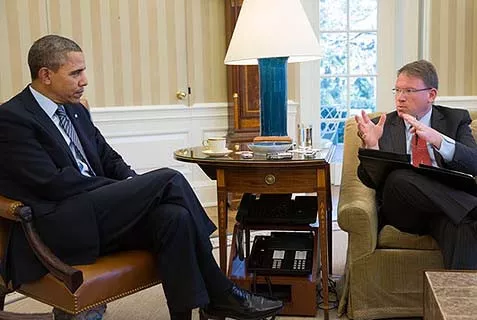Sanctions and Iran’s economy
- Rouhani’s Minister of Labor and Social Welfare said Iran can no longer afford Ahmadinejad-era cash handouts, arguing that “to continue this system is not defensible with the current situation of the country.” (AFP, 5/19)
Iranian domestic politics
- Mohsen Rezaei returned from retirement and was apparently re-awarded rank of Major General in the Revolutionary Guards. He had left the Guards and unsuccessfully ran for president. He appeared alongside Khamenei in full uniform this week. (AEI Iran Tracker, 5/22)
US-Iran relations
- Former Defense Secretary Robert Gates criticized framework nuclear deal in interview on Face the Nation: “I don't think the alternative is war. One alternative is better deal. I think that you go back to the sanctions, I think you reinforce the sanctions, and you basically say, here are the additional things we need for this agreement to work and to be worthwhile, and an agreement that reassures our allies or at least doesn't scare them half to death.” (CBS, 5/17)
- “The idea of being able to have these snapback sanctions, that sanctions could be re-imposed once lifted is very unrealistic. I think that the pursuit of the agreement is based on the President's hope that over a ten-year period with the sanctions being lifted that the Iranians will become a constructive stakeholder in the international community. That-- that as their economy begins to grow again, that-- that they will abandon their ideology, their theology, their revolutionary principles, their meddling in various parts of the region. And, frankly, I believe that's very unrealistic.”
Geopolitics and Iran
- Iran consented to international inspection of an aid ship headed for Yemen, ending a potential standoff. The aid ship is escorted by Iranian naval vessels. (Bloomberg, 5/20)
- Four large Iranian cargo ships earlier this year transported goods from Iran to Houthi-controlled port in Yemen. According to a Financial Times investigation, “the ships changed their ensigns, turned off their tracking devices at key points during their voyages, registered false information in international shipping logs and met unidentified craft mid-ocean.” The ships’ contents were unknown. (Financial Times, 5/22)
- Iran has cut support for Palestinian Islamic Jihad in Gaza Strip, following the group’s refusal to support Iran-backed Houthis in Yemen. (Jerusalem Post, 5/21)
Israel
- American and Israeli defense officials have started informal discussions about an increase in American military aid upon signing of nuclear deal with Iran. New aid package could include as many as 50 F-35 fighters, additional Iron Dome batteries, Arrow 3 missile interception system, new precision-guided bombs and intelligence collection equipment. (Ha’aretz, 5/20; Times of Israel, 5/20)
- Amos Harel, Ha’aretz: “There will be no official negotiation between Israel and the United States on compensation to Israel in the event of a deal (the current deadline for which is June 30), so that Israel cannot be perceived as having come to terms with the pact.”
- Israel said it notified the US of Iran’s purchase of Airbus aircraft – which violated sanctions – but transaction proceeded anyway. (Reuters, 5/19)
- A Swiss court reportedly ordered Israel to pay Iran $1.1 billion in dispute over a Shah-era oil pipeline deal. Israel’s Finance Ministry said Israeli law prohibits “trading with the enemy.” (Ha’aretz, 5/20; AFP, 5/21)
- Khamenei’s military adviser, Gen. Yahya Rahim Safavi, said: “Iran, with the help of Hizballah and its friends, is capable of destroying Tel Aviv and Haifa in case of military aggression on the part of the Zionists,” with more than 80,000 rockets based in Lebanon. (AFP, 5/22)
“Red lines,” “points of no return,” and military strikes
- No significant developments.
Uncertain or dubious claims
